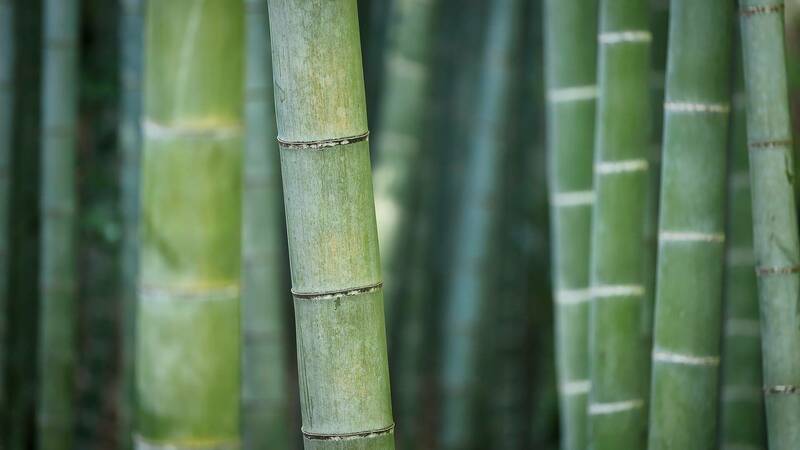The bamboo forest in my grandparents’ backyard was not something I expected when I first lived in their home in the countryside as a child. What I expected there was boring, rural life, but the bamboo forest changed the story. It was my first time to see a bamboo forest due to my long living in the city, where high buildings and concrete roads occupied the space that originally belonged to the natural scene. It possessed a sense of tranquility that I could not explain in the beginning—just watching it gave me comfort that relaxed my mind. My grandpa was very fond of bamboo, because in ancient Chinese times, people had the opinion that “without bamboo, without grace”—which means, bamboo adds grace to people’s lives. Therefore, a few ornamental bamboos planted by my grandpa ten years before transformed into the forest that covered half of the backyard.
My first impression of the bamboo forest started to form on the quiet morning of the first day of my visit. The view of the bamboo forest was irresistible. Rows of bamboo stood tall and upright, just like soldiers standing there motionless. Above pieces of bamboo leaves were crystal clear morning dews, like a bright dazzling diamond. The sun came out, the golden sun shining on the dews, offering them a special glamor. In spring, the breeze blew, and the bamboos close together were like pairs of good friends in each other's embrace, bowing their heads and whispering. Bamboo reflected in the water looked like a mountain ink painting; suddenly, waves appeared on the water, and those bamboo shadows on the water jumped with the ripples. When the wind blew, the bamboo leaves make rustling sounds, just like playing a beautiful song. Then the sight of the waving green ocean appeared, which was like bamboos stretching their bodies. The views and sounds of bamboo broke the uncontrolled pressure and mundane worries from my life and school.
On the following days, when I was enjoying the view of the bamboo forest, my grandpa sometimes joined me and talked about the meaning of bamboo in ancient China. He said that ancient Chinese people loved bamboos, and since bamboos are not common these days, the things we praise about bamboos are always related to some specific virtue of ancient Chinese gentlemen, which are still valued today but even more so in ancient times. When I asked about their virtues, my grandpa explained while caressing the unadorned bamboo: they looked simple, without the pink-red of spring peach blossoms or enchanting appearance of Luoyang peonies. It was just like a woman of “Jiangnan” in Chinese culture, whose dress is simple and whose appearance is without artifice, giving a person the feeling of returning to nature. However, inside bamboos’ simple appearance were their noble qualities. They had a humble life and were selfless: they never blossomed but would grow a kind of white flower at their top at the end of life. Along with their passing life, the flowers yellowed gradually and faded when they died in order to give newborn bamboos more space to survive. They were not afraid of winter since they stood upright all year long. They never succumbed to storms since they bent rather than broke. All these actions made people think of the virtues of humans. Specifically, they reminded me of my mom, who gave up her limited spare time to help me grow as an independent man, without any concern that I might one day accomplish more than she did. She also never left me alone or succumbed in front of burdensome tasks on her most exhausted day, but still cared about my health and life. I could find all these virtues in bamboo, which is why bamboo was loved and praised by my grandpa even though it looked unadorned.
Moreover, bamboo sacrificed itself for the health of humans: their leaves could be used to make tea, which had the effect of cooling and relieving inflammation and fever. Also, the greatness of bamboo is that it can be made into various kinds of things: small and delicate bamboo baskets can hold things; solid bamboo stools and bamboo chairs can let a person sit in comfort; refined bamboo mats are indispensable for midsummer; Bamboo flutes contribute to a unique Han music culture; and Bamboo fishing pole bobs, though not flashy, are so useful that hours are spent with them for fish-catching. Overall, things made of bamboo appeared everywhere at any time, so that we might even ignore their existence and forget their significance in life.
Learning all those qualities about bamboo, I began to understand why I had felt a sense of tranquility the first time I saw the forest, and now I just wanted to feel it more personally and closely. Standing up and walking among the bamboo trees, I seemed to merge into the ancient culture, talking to famous Chinese poets and sages, escaping from modern life and enjoying peaceful moments. The bamboo trees seemed to turn alive, welcoming me to their generous homeland. Having been with the forest for a long time, I believed that the virtuousness and protection from the chaos brought by the bamboo forest were why my grandpa was in great health and led a positive lifestyle. After that, every time I came to my grandparents’ home, I would idle around in the bamboo forest and smell its brisk and natural odor, which eased my mind.
Every time I got into the car back to the city, I would give my last sight to the bamboo forest. Week after week, the bamboo forest looked the same as when I first saw it—giant, slender, and erect “poles.” I praised them for their continued qualities, which are rare in today’s society, where people do not live as themselves and change their surface for different people. Considering the bamboo’s gently swaying leaves as a sign of farewell, I could not forget their simplicity, virtues, and significance in life. Back in the city, there was rarely a peaceful moment: honking of horns from cars broke the tranquility of the day early in the morning. People talked, worked, and thought at a great pace, worrying about their academic and work performance. I felt like I had left the place of tranquility and immediately started to anticipate my next interaction with the bamboo forest.

